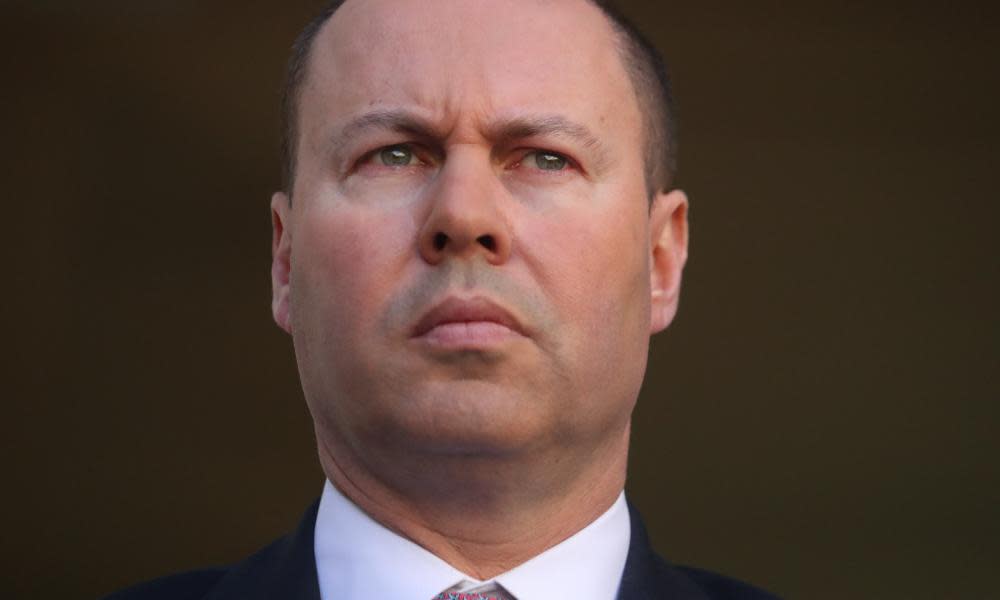Scott Morrison dismisses calls for Josh Frydenberg to front Covid-19 inquiry over jobkeeper

Labor will attempt to pressure the treasurer, Josh Frydenberg, to appear before the Senate’s Covid-19 inquiry to explain the “$60bn black hole” in the jobkeeper program – but the government has dismissed the call as a political stunt.
The move comes as the Morrison government faces growing calls to expand the wage subsidy to cover a wider group of workers, after revelations on Friday that the six-month program is now expected to cost the budget $70bn rather than $130bn.
Labor’s Senate leader, Penny Wong, said Frydenberg should have “the courage” to accept a forthcoming invitation to appear before the Senate select committee on Covid-19 to take responsibility for the error.
Related: How do you lose $60bn and where does this leave Australia? | Danielle Wood
“We’d say to Josh, when you’ve got a budget blunder of this size, I reckon it is about time you fronted up and explained it,” Wong told the ABC’s Insiders program.
Senate inquiries cannot compel ministers from the lower house to appear before them but those invited to attend can choose to do so voluntarily.
When Scott Morrison was immigration minister and agreed to appear before a Senate committee to answer questions about boat turnbacks in 2014, he was the first lower house minister to front an upper house inquiry in more than 20 years.
Despite having previously appeared before a Senate committee himself, Morrison said on Sunday the Labor party should “know that House of Representatives ministers don’t appear at Senate inquiries; that’s not the normal practice”.
“I think to now try and change the rules exposes that as a bit of a political stunt,” the prime minister said at a media conference alongside the newly preselected Liberal candidate in the Eden-Monaro byelection, Fiona Kotvojs.
Morrison denied the revision (which means just 3.5 million workers are likely to be covered by the $1,500 fortnightly payment, not the 6.5 million estimated at one point) raised any issue with the government’s overall economic competence.
He said when the Treasury had calculated its original estimate that the program would cost $130bn over six months, it was a very uncertain economic time.
“I’ve got to tell you, on the day it was a big gulp for the government to understand what we needed to do but we didn’t flinch,” Morrison said.
“We knew this was necessary and we responded quickly. We made the estimates based on the best information we had available to us and that proved to be overly cautious.”
He said there had been no loss to the taxpayer – “in fact it’s been the reverse”.
The Covid-19 inquiry chair, Katy Gallagher, said the committee would like to hear from Frydenberg before the next sitting of parliament, which is scheduled for the middle of June, because the treasurer was the architect of the scheme.
She said one of the important consequences from the revision was that the government was no longer on track to spend the equivalent of 16.4% of GDP on the various measures aimed at supporting the economy through the crisis.
“It’s now over to him to come and explain and if he doesn’t, then I think he’s got to explain what he’s got to hide,” Gallagher told reporters at Parliament House.
But in a sign that Frydenberg is unlikely to appear before the inquiry, a government spokesperson said the arrangements for the Covid-19 committee were for ministers who served in the lower house to be represented by their Senate representative ministers, akin to Senate estimates hearings.
So far, the government has not given any indication it is planning to extend the $1,500-per-fortnight jobkeeper scheme to workers who currently miss out, such as casuals employed for less than a year, university and local government staff, temporary visa holders and employees of foreign-owned companies.
However, a scheduled review in June may look at tweaks to the scheme, including the potential to extend targeted support to the worst-affected sectors beyond the expiry in September.
Treasury and the Australian Taxation Office said in a joint statement on Friday that about 1,000 businesses appeared to have made significant errors when reporting the estimate of eligible employees on their enrolment forms.
However, when announcing the scheme in late March – prior to any enrolment forms being completed – the government said it was expected to cost $130bn over six months.
Related: Retirees face financial ruin as coronavirus slashes share dividends
The energy minister, Angus Taylor, said on Sunday the original forecast was never “an objective or a target”.
“It does mean that we’re in a better position as we work our way towards recovery and that is fantastic news,” Taylor told Sky News.
Taylor played down the prospect of expanding support to universities or short-term casuals. He added that “we’ll see what comes out of” the forthcoming review, which would “proceed reasonable quickly”.
Pre-existing calls for the government to widen eligibility of the scheme are likely to grow louder now that the revised figures have been revealed.
Frydenberg said on Friday that new figures were “not an invitation to spend more money” and the government would apply budget discipline.
During an interview with the ABC on Friday, the treasurer was asked whether he took responsibility for the mistake.
He replied that the Australian Taxation Office and the Treasury had “made it clear what has occurred here” and some businesses had made reporting errors. “I’m not blaming Treasury, and I’m not blaming the ATO,” he said.

 Yahoo News
Yahoo News 
